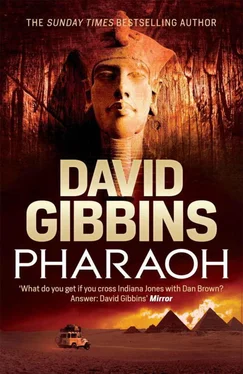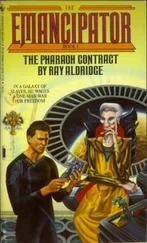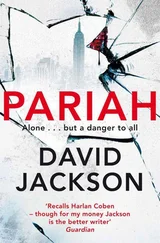He thought about what Rebecca had said, and about those things that had so excited him about his ancestors: exploration and adventure and risk-taking. He had taken a risk in going to the site of the Abbas , and it had not worked out. Risk-taking was all about accepting the possibility of failure. Perhaps he had been too lucky during his career, and needed to learn humility. Rebecca was about the future, and that was where he needed to put his mind now. He took a deep breath, and exhaled slowly. Sitting in the middle of his desk was the press release from Sofia about the Beatrice , waiting to be read. He might not be able to tie up all the loose ends in the Sudan, but the discovery of the Beatrice was a fantastic result and he would do everything in his power to make sure that the project put IMU in the best possible light. He pushed back his chair, put his feet down and picked up the report, feeling better already. He remembered what Sofia had called their submersible, Nina , after Columbus’ ship, and how she had wanted IMU to go to the Americas: maybe she was right. It had been almost eight years since he had taken an IMU team to Canada and then to Mexico, on the trail of crusader gold. For several years now, while there was so much going on elsewhere, he had resisted pleas from their US representative to start a new project in America. That was where he would go next. He needed a fresh start, new horizons, like Columbus. He would talk about it tomorrow morning when he had the meeting with the IMU board of directors to explain the Abbas incident, so that he could end the grilling on a positive note. And he would get Hiebermeyer to call in to outline his plans for returning the sarcophagus of Menkaure to its rightful place inside the pyramid at Giza.
He thought of that word: pyramid . It triggered something, a very distant memory. He put down the report and picked up the brown envelope that Corporal Jones had sent to his great-great-grandfather, the envelope that he thought had contained some kind of artefact. He looked at it again, tracing his fingers over the careful handwriting of the address, and then glanced at the portrait of Colonel Howard. That was it. He remembered now. His pulse quickened, and he sat upright, thinking back forty years. It had been in this very room; he and his grandfather had been standing in front of that very portrait. His grandfather had been telling him how as a young boy he had been allowed once a week to go upstairs into the attic where his own grandfather had lived, to see his stamp collection. It had been during the few years of Colonel Howard’s retirement before his final quest into Afghanistan, and he had lived not here but in a cruck-framed half-timbered cottage in a remote village in Herefordshire, a secluded place where he could get on with his writing projects without distraction. His daughter and grandchildren had lived downstairs. But it was not the stamp collection that had so intrigued the little boy. It was an ancient artefact, a square stone with carvings all over it, sitting in a niche in the old timbers of the wall. His grandfather had remembered it so clearly all those years later because the big timbers of the cruck frame came together to form an inverted V shape in the attic, just like a pyramid. And that was what he had seen on the ancient stone: a pyramid. Colonel Howard had told the boy that he had been sent it from Egypt, and that it had once been in an ancient temple.
Jack was suddenly coursing with excitement. Could it still be there? The cruck-framed house was still in the possession of the Howard estate, lived in by one of Jack’s elderly aunts. He pulled out his phone, scrolled through the address list and made a call. There was no reply, and he left a message. He drummed his fingers against the desk. He could make it up there today, and return in time for the meeting tomorrow morning. It would be a long drive, but he could do with it. And if there was a result, it would be something else he could throw in front of the board of directors.
Rebecca came bounding through the door, holding a small brown parcel that looked about the same vintage as the envelope Jack had been looking at, though hers evidently still held its contents. Jack knew there would be numerous interesting items among Colonel Howard’s papers, and this package was too big to be Lieutenant Tanner’s letter. She was flushed with excitement, but Jack held up his hand. ‘Before we get distracted by anything, I may have made a breakthrough. I remembered something your great-grandfather told me years ago about an ancient Egyptian artefact shown to him by his grandfather, Colonel Howard. It’s just possible that it’s the artefact that was once in the envelope that Corporal Jones sent him. And I think I know where it might be. We might have to drop everything and go on a long drive.’
‘Hold it right there, Dad. First, this.’ She took a single sheet of old letter paper out of the package she was carrying, cleared her throat and stood upright. She sniffed, and Jack realised that she had been crying. ‘What’s wrong? Are you all right?’ he asked.
‘It’s just this,’ she said, holding up the letter. ‘I’ll be fine.’ She cleared her throat again. ‘This is the final page of the letter from Lieutenant Tanner at Semna to Howard. It’s very affectionate; they seem to have been great friends. Tanner was in love with Howard’s sister-in-law, and was planning to marry her when he returned from Egypt. I think the letter was written somewhere dusty, not at a desk. He’d been doing something grim, burying some comrades, and the tone of the letter is as if he’s making the best of a bad situation, taking his mind away from it.’
Jack leaned forward, suddenly riveted. ‘That would be the sangar, and the grim business would be the burial of the two soldiers killed there by the Mahdist sniper. Incredible. This really gives the story behind Maurice and Aysha’s discoveries.’
‘He mentions the crocodile mummies,’ Rebecca said. ‘As an archaeology enthusiast he must have recognised them for what they were, as the soldiers were digging through them to make the graves.’
‘Read out the entire page, Rebecca.’
She took a deep breath, and began:
‘As well as the extraordinary crocodile mummies, there is another remarkable archaeological discovery here that I’d love to tell you about but it will have to be another time, when I can sit down undistracted and do it justice – suffice to say that Edward Mayne was here with us, and went with the major of the Canadian contingent and myself into the underground temple, through the barest of cracks at the top of the door – that really gives the game away to you, doesn’t it, but it’s not fair to keep you on tenterhooks, until I write next time; at any rate Mayne took a small stone slab with carving which he instructed me to give to his servant, Corporal Jones, who you will remember from the Rampa expedition when he was a sergeant, and I instructed Jones to send it on to you if Mayne should be killed. It may be merely of passing interest to you, I fancy, but as I believe you have been appointed curator of Gordon’s antiquities – for which my congratulations – it would make sense for you to be its recipient. Corporal Jones, incidentally, is for the Railway Company, to keep him out of mischief and away from any fights, though I fear we may all be in line for that in due course, with the Mahdi’s army growing daily. Mayne is for headquarters at Korti and some secret mission, I know not what. He has being doing reconnaissance out here. (You will remember that he instructed us in sharpshooting when we were juniors at Chatham; he has his rifle out here, I believe it is a Sharps, tho’ he keeps it concealed. It was he who used one of our rifles to pot the Mahdist sharpshooter who killed our two poor soldiers.)
Читать дальше












